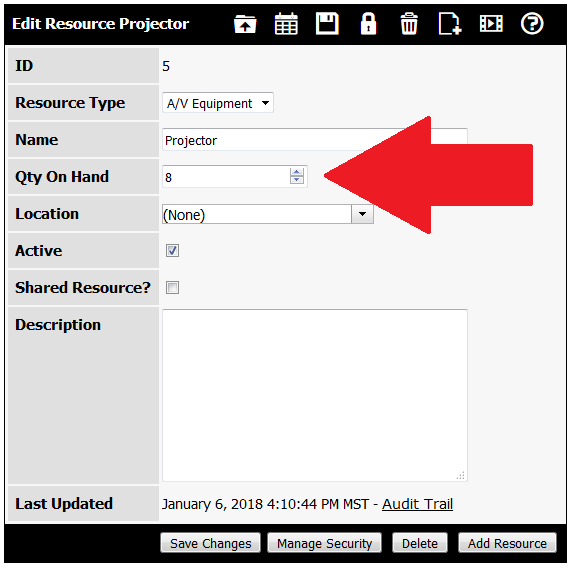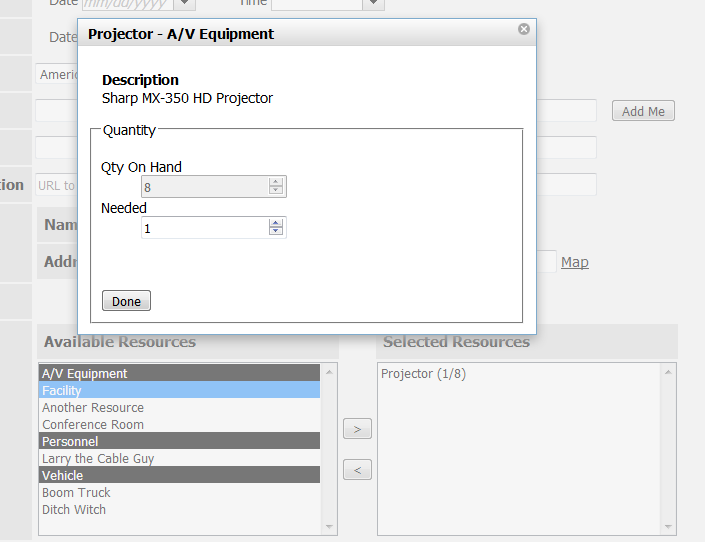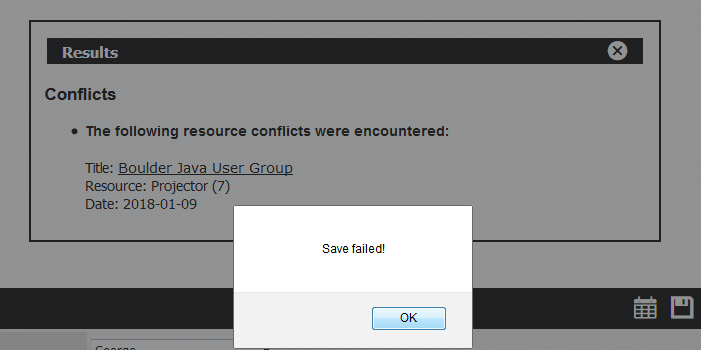One of the really cool new features connectDaily 5.0 introduced is Pooled Resources. Pooled Resources are resources where you have more than one of particular item, and you don’t need to track the specific items by name. Common examples would be Tables, Chairs, Laptops, Projectors, Projector Screens, A/V Carts, etc.
Using the new Pooled Resource feature, you could add “Large Round Table” as a resource and set the quantity on hand to be 12. When you create an event that needs tables, you would select “Large Round Table” and then enter the number you need. If you have two events next Thursday evening that each use 5 tables, and you try to create another event for Thursday evening that uses more than 2 tables then a resource conflict is displayed.
Scheduling Pooled Resources
Creating Your First Pooled Resource
The first step is to create your new pooled resource and specify a quantity. From the menu, choose Edit | Resources. On the List Resources Screen, click on the Add Resource button. You’ll be taken to the Edit Resource Screen. Enter your resource name, quantity on hand, and a description if desired.

Create Your Calendar Event Using the Resource
Next, create your event and add a pooled resource. When you add a pooled resource to an event, a dialog box will appear displaying the resource’s description, the quantity on hand, and you can specify how many you need. If you want to change the quantity after you’ve already added it, right-click on the resource and choose “Change Quantity” from the context menu.

When Resource Conflicts Happen
If you try to use more of a pooled resource than are available, a resource conflict is displayed:

Scheduling Conflicts
One of the common questions we hear is: “Will it only show the quantity available?” In other words, will connectDaily take into account how many tables have been used and only show the number remaining? The answer is no.
The first reason is that until all of the event information is entered including start and end date, times, and recurrence patterns, we don’t know WHEN to check for conflicts. While it’s theoretically possible, it would require connectDaily to constantly re-calculate the available resources while you’re editing the event. Each time a date/time/recurrence field is changed, the available resource set would have to be recomputed. With pooled resources this is even more complicated because we have to find ALL of the conflicts (as opposed to just finding one) and compute the quantity in use at the time of the occurrence of the event. Even more complicated is that it’s possible for users to add resources BEFORE entering any dates or recurrence. So, potentially we have a problem where someone selects resources, then enters/changes date/time/recurrence information, invalidating already selected resources.
The second reason is that if you started adding your event, but didn’t save and went to lunch, when you return the number available might be different. What we’re saying is that even if we calculated the quantity available at the time you added the resource to the event, we can’t guarantee that quantity will be available when you hit the Save button. connectDaily could lock ALL resources when someone enters the edit event screen, but then only one person would be able to use the create event screen at a time. If someone opened the screen and went to lunch, all other users would be locked out.
The third reason is a little more subtle. When you select Save and connectDaily checks for resource conflicts, it’s usually between 1 and 4 resources that are being requested. If you have 100 resources in your system, then to speculatively check availability, connectDaily would have to check availability of not 1-4 resources, but ALL 100. Compounding this is the issue of recurring events. If you create an open-ended recurring event, connectDaily has to check out some period in the future to be reasonably sure there are no conflicts. So, this means that connectDaily would have to look at 100 resources over a period of 2-3 years, which could be potentially thousands of calendar events. If we check availability every time something in the date/time/recurrence pattern changes, we’re talking about doing this 4-10 times PER EVENT. The worst case will happen EVERY TIME you create a recurring event because each time, there will be some recurrence pattern without an end date. This would take a lot of computational power, and it would cause noticeable performance delays. Redesigning the edit event screen as a wizard could potentially reduce the number of checks to one at the cost of making it more difficult to edit events.
Finally, there’s one more issue left. Say for example, you create an event, and you want a specific room. connectDaily determines that room isn’t available at the time your event needs and doesn’t show the resource. When that happens, your most likely reaction would be to submit a support request to us because the desired room isn’t showing and you know it’s in the system. In order for you to be able to manage your facility, you need to be shown WHY the resource isn’t available which means showing you the conflicts.
Even though it might not make sense at first glance, from a user interface standpoint the best way to handle these issues is the way we’ve chosen . You can select the quantity needed for your event. When you attempt to save, we’ll tell you if that won’t work and why.
Resource Approval Notes
Resource approvals work as they always have. However, if the resource is approved and then the quantity is changed, then the following rule applies:
- If the quantity used is increased, then the resource approval will be removed. The approvers for the resource will have to then re-examine the resource usage and approve it.
- If the quantity is decreased, then the resource approval will be left in place. If 12 laptops were approved for a class, but the number of students was decreased and the number of laptops was reduced to 10, then the approval would remain.
Wrapping It Up
connectDaily 5.0’s new pooled resource feature is a great addition to one of connectDaily’s best features. It allows you to have additional control over events you scheduled. Your facilities staff will really appreciate the additional information that’s provided, AND the fact that resources won’t be over-booked